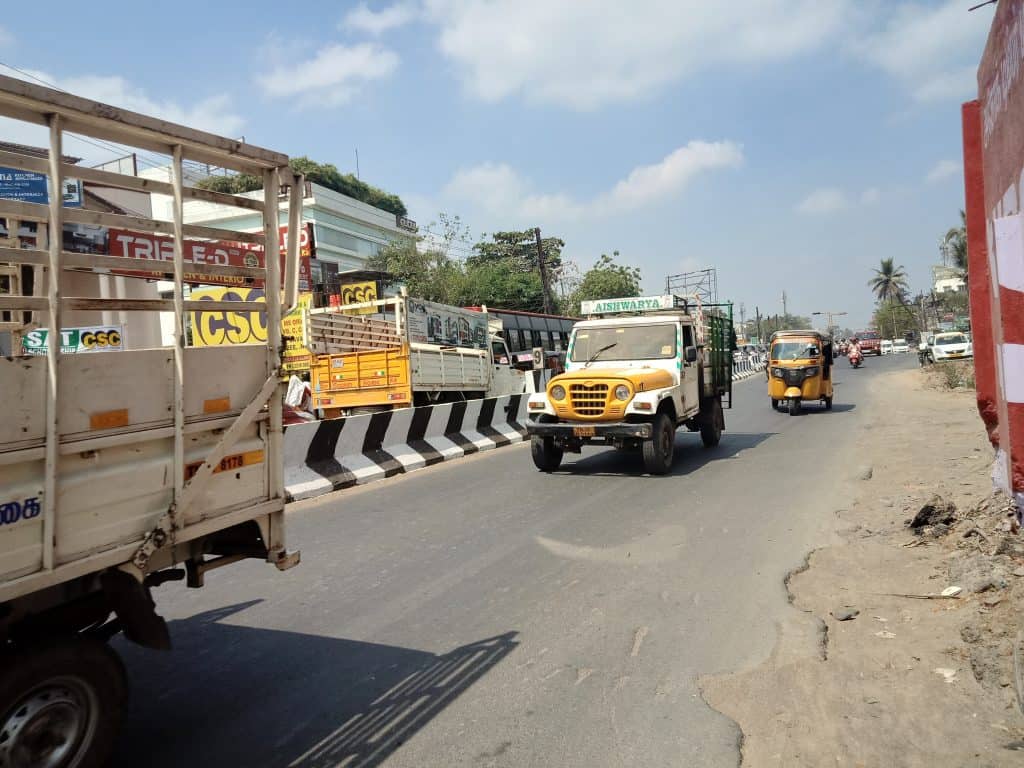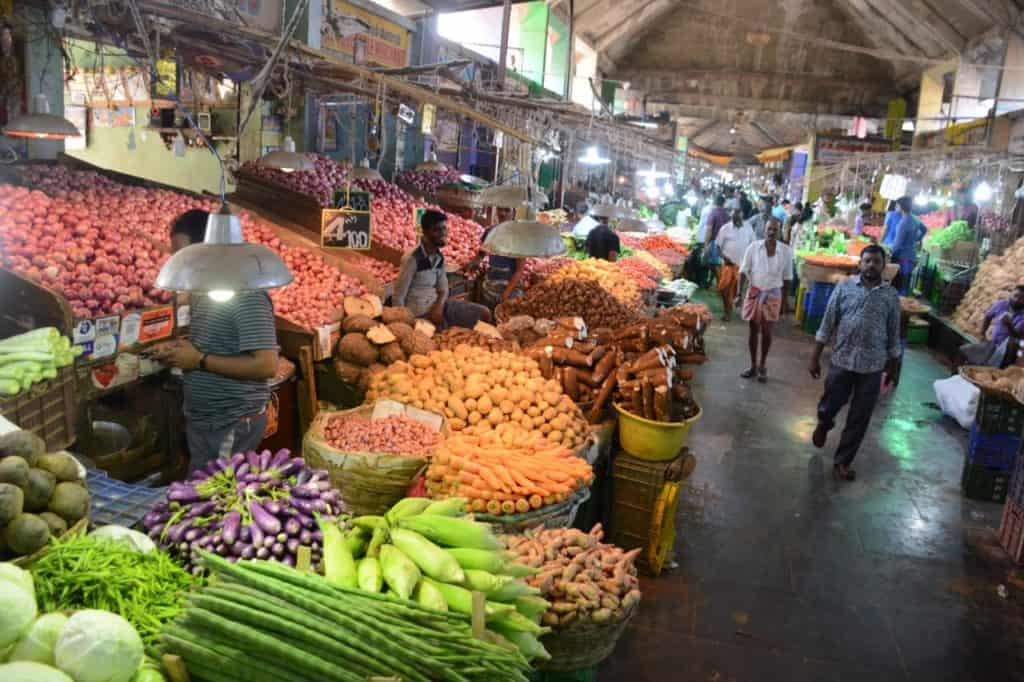The ever-bustling Velachery Main Road in Chennai is deserted now, thanks to the impending imposition of Section 144 by the Tamil Nadu government. The coronavirus scare has led people to stay indoors and maintain social distance fearing contact transmission. In many parts of the city, shops are open only for a few hours and there is panic buying to stock up on essentials. There is an informal instruction issued by the cops to shut down supermarkets to limit crowding. In this scenario, have the small businesses in Chennai seen an increase in business yet? Sadly not. With lockdown in force, they are anxious about making ends meet.

With major IT companies allowing employees to work from home, the vehicle flow on Velachery Main Road in Selaiyur has been low on a weekday morning. Pic: Bhavani Prabhakar
B Ponseelan, Choolaimedu General Merchants’ Association and owner of a provision shop, is visibly tense and worried about paying the rent for his house and the store. His customer base is reducing due to the coronavirus scare and he is worried about providing for his four-member family.
“My daily sales ranges between Rs 5,000 and Rs 7,000; today I made just about Rs 3,000,” he rued.
Interactions with such sellers reveal that coping with life during a pandemic has been very challenging.
Chain of effects
“I have not had good sales over the last two days. Conversations with a few of my customers indicated that most of them have fled or are fleeing the city. I have not had any customer panic-buying provisions and groceries in bulk so far. Saving up for my daughter’s school expenses next year will certainly be difficult,” E Raj, who runs a provision and grocery shop on Velachery Main Road, said.
Echoing Raj’s thoughts is vegetable and fruit vendor A Vasanth whose customers are still purchasing in small quantities as the Koyambedu market is functional. He added that he has not paid his six-monthly shop rent yet. “I’m figuring out ways to clear the dues.”
Jaw-dropping offers at supermarkets and platforms like BigBasket are also being touted as the major factors affecting small businesses. Once the sale ends, the attention will hopefully be back on the local vendors.
What can be done to reverse the damage once the panic dies down? What about the mounting debts and outstanding expenses? “The primary cause behind the dip is fear and it will take time to get over it,” J R Shravana Deepan, a city based chartered accountant who works with small businesses, commented. “Considering the severity, it is only fair to understand the situation, be humane and give some time to tide over personal issues like paying rents.”
As most companies employees have been working from home, the eating joints are not doing too well either. Gopinathan V, owner of an eatery in Selaiyur, said, “A week ago, I was earning Rs 1,300 a day.” Now?
Customers are no longer allowed to dine in, and most of the eateries in Chennai are experiencing more than 50% dip in sales. S Aiyappan from a tea shop on Velachery Main Road is in the same boat as Gopinathan. As the lockdown looms haead, he desperately waits for a customer and is thinking of ways to answer his boss. “I had only 10 customers yesterday as against the crowd I had last week,” he informed.
The eateries are likely to bounce back only after the situation returns to normalcy. Until then, experts opine that owners keep disinfecting the premises regularly to be on the safe side.
The small machines and electronics market is one of the worst-affected, owing to the travel advisories and import-export restrictions. Electronic items, machines, and pumps are some of the key products that are imported from China. In the wake of the pandemic, the sector has taken a hit. “Most people don’t realise the extent to which we rely on the import of Chinese products in our daily lives,” Deepan explained.
There are many people whose livelihoods cannot be resurrected on their own; for instance, the daily wage earners. In such cases, the state government is expected to act proactively and extend some support, similar to that announced by the Uttar Pradesh government.
‘Business as usual’

Unlike the ordeals experienced by small vendors, Koyambedu is bustling. Vendors say vegetables and fruits from 300 lorries are being unloaded. “The sales are brisk and did not get affected by the coronavirus scare,” V R Soundararajan, advisor, Koyambedu Wholesale Traders’ Welfare Association, said. Pic: Bhavani Prabhakar
The selling cycle is different here: the retailers buy from the wholesale market and sell it to the public. Due to competitive offers from other sources, the small vendors are facing the brunt.
General Secretary of Koyambedu Small Vendors’ Association, V Kathiresan said that a small number of residents from the vicinity visit the market to buy in minimum quantity. “Such customers have not been seen for a few days as the government has advised people not to congregate in large numbers,” he said.
Vendors from Koyambedu highlighted the measures taken by the administrative officers to clean up the garbage around the market. “We have been holding meetings regarding waste management with our association members,” Kathiresan said.
Travelling travails
Travel planners in Chennai, as in most parts of the world, are currently in deep waters, dealing with trip cancellations. Although they may not witness major losses as they levy cancellation fees, the business is definitely impacted. “I had sold about eight international and two domestic trips from January, and all stand cancelled. My hunch is that this situation of having no business will prevail until May. Salaries of my employees should be manageable through my other gigs,” Dilip Srinivasan, a travel planner, said.
However, the levy of heavy cancellation charges is unpalatable to the customers. Many travellers are requesting the third-party vendors to waive off the cancellation charges and reschedule the flights until the end of the year. “I booked a personal trip to Pune earlier this month, with two-way fare of Rs 14,000. The refund I got was somewhere around Rs 6,000; the deduction is unfair,” N Subramanian, an IT employee from Chennai, said.
It is going to be a long haul to normalcy.